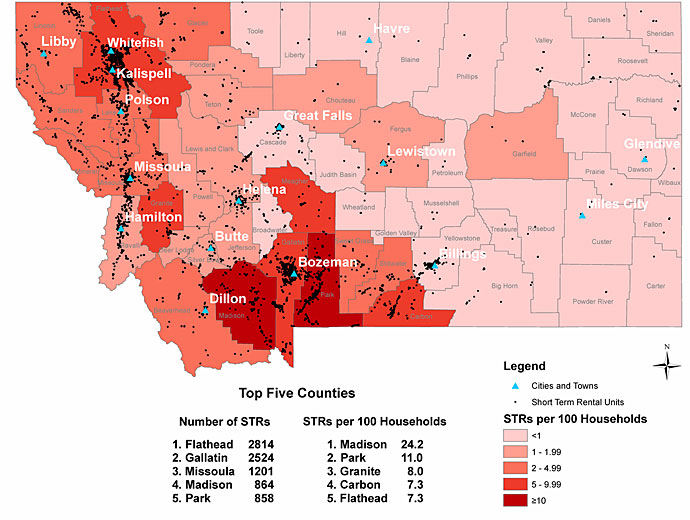UM Study Assesses Impacts of Short-Term Rentals in Montana

MISSOULA – Two new studies from the University of Montana assess the positive and negative impacts of short-term rentals on Montana communities, as well as examine the visitors who use STRs, their motivations and characteristics. The studies were highlighted in a report by UM’s Institute for Tourism and Recreation Research.
Short-term rentals usually are private accommodations that travelers book online through sites such as Airbnb and VRBO for less than 30 days. During the last five to seven years, the availability of and interest in STRs have soared, with little knowledge of their true scale in Montana, how these new accommodation choices are regulated and the makeup of STR guests and hosts. The new ITRR report answers those questions.
As of September 2020, over 12,000 STRs had been active in Montana at some point during the preceding 12 months, with Flathead and Gallatin counties showing the highest volumes. Meanwhile, Madison and Park counties have the highest densities of STRs (STRs per household).
Interviews with city and county officials in selected communities around the state revealed a wide variety of STR regulations. There are no regulations in some smaller towns and counties. Some areas require a business license or special use permit, fire marshal inspection, street parking standards or providing emergency phone numbers for guests. Some areas have zoning limits on the number of STRs allowed.
The lack of consistent policies related to STRs seems to have worked for most areas up until now, according to many city and county officials, who feel that they don’t have enough STRs or haven’t had enough complaints about them to warrant developing policies at this point.
Many of the perceived challenges facing STRs in Montana are similar to the challenges that STRs experience globally, such as negative impacts of STRs on long-term rentals and affordable housing for working families, disruptions for neighbors, loss or change of community identity and change of the community feel.
On the other hand, many respondents emphasized positive impacts and benefits that STRs can provide in Montana, such as tourism and monetary benefits and diverse accommodation options.
The potentially positive impacts identified by these community leaders are reinforced by the online survey of travelers and STR hosts also explored by ITRR. Of the leisure travelers surveyed, 40% said they are likely to seek out STRs for their trip, in Montana or elsewhere, and 7% of business travelers said the same.
Over three-quarters of travelers have either stayed in an STR at least once (61%) or are interested in giving it a try (16%), with reasons of cleanliness, safety and location being the most important features considered when choosing an STR.
Of survey respondents who have stayed in an STR within Montana, location, use of a kitchen and comfort topped the list.
Reasons for being a short-term rental host are varied, but financial aspects topped the list. The three most important reasons to rent out a room or home include making money; helping pay for insurance, taxes and utilities; and using the place as an investment.
“This information is intended to help city and county officials better understand the STR market and make informed decisions about STR policies,” said ITRR social scientist Elena Bigart. “It should also assist STR guests and hosts to have better experiences. Our study is one of the first steps to collect information about STRs in Montana. Future research efforts are needed to analyze the trends of STR usage in the state and evaluate the success of STR regulations over time.”
For the full report, visit https://scholarworks.umt.edu/itrr_pubs/418/.
All ITRR reports are available on the website at http://itrr.umt.edu/.
###
Contact: Elena Bigart, social scientist and research associate, UM Institute for Tourism and Recreation Research, 406-243-6210, elena.bigart@umontana.edu; Jeremy Sage, ITRR economist and interim director, 406-243-5552, jeremy.sage@umontana.edu.